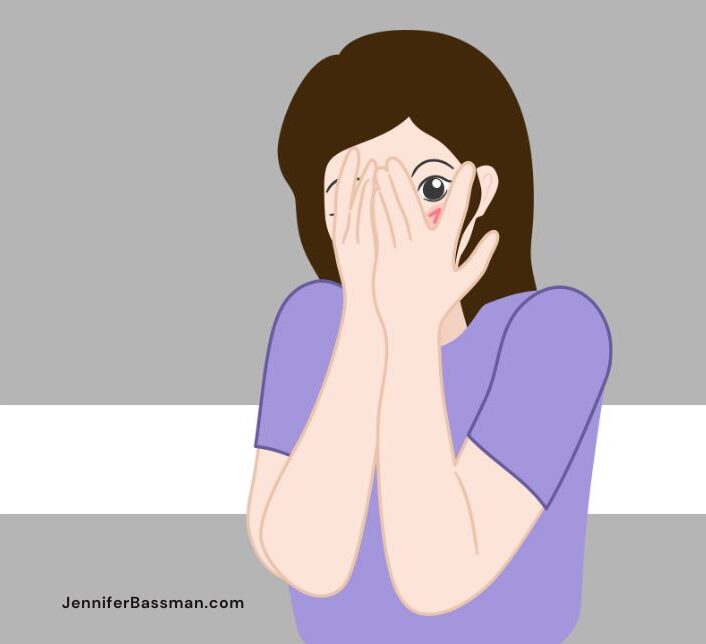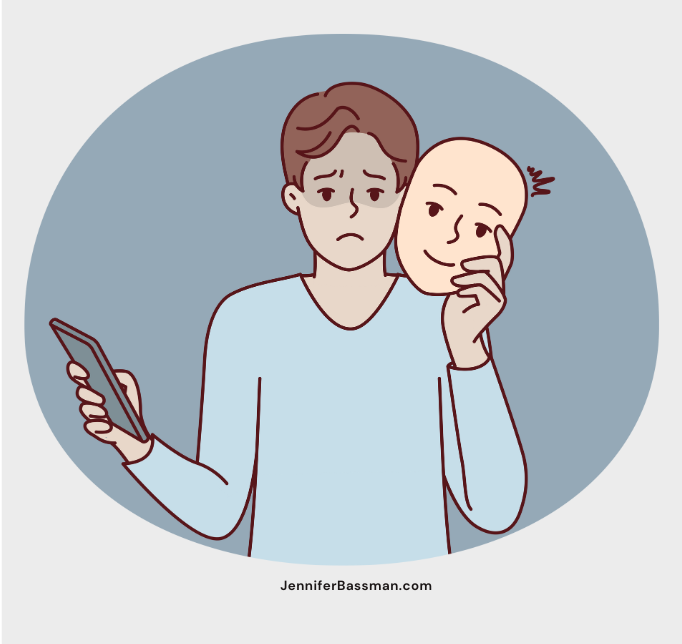First, while getting older is a privilege, it can also be a path paved with regret and what ifs.
For those of you who feel stuck, unfulfilled, or like you’ve made the “wrong” choices: you totally did.
(Stop clutching your pearls and being appalled that I dare tell the truth.)
Feelings of regret are stressful, overwhelming, and exhausting.
Regret is an often-overlooked emotional and mental drain that can fuel chronic stress and burnout. You spiral into thought patterns of overthinking, unresolved anger, resentment, and toxic rumination.
And, let’s be honest, for most of us regret is one the least productive phases we go through.
Want to make better decisions? Check out my Empowered Decision-Making Guide and Workbook.
How Regret Fuels Chronic Stress, Burnout
Look, if you’re alive, you’ve made mistakes. That’s just how life works. Some of us regret major career decisions. Some of us regret our entire high school style “evolution.” Either way, here we are.
What categories of regret have you had the most success?
- Career Regrets (i.e. I Stayed In the Wrong Job Too Long Regret)
- Personal Regrets (i.e. I Didn’t Set Boundaries and Now I’m a Doormat Regret)
- Haircut and/or Outfit Regrets (i.e. Peekaboo Bangs Were Not My Best Look Regret)
- Love / Relationship Regrets (i.e. Why Did I Ever Date That Person Regret)
- Emotional Regrets (i.e. Why Did I Care So Much About What That Bitch Carol Thought of Me Regret)
- Financial Regrets (i.e. I Should Have Saved More Money When I Was Younger Instead of Going Out Every Weekend Regret)
- Miscellaneous Regrets (i.e. I Can’t Believe I Ate That Entire Bag of Snickers Minis Regret)
If you’re human, you have plenty of examples for each of the categories listed.
Most of us see regret as a shame and guilt-filled part of life. Just somewhere our minds go when we’re feeling bad about ourselves or where we are in life. Usually, when we’ve hit another life milestone or made another regrettable mistake.
Lingering in guilt/shame/resentment fuels your stress response. You keep telling your brain that regret is a threat, so it responds by setting off your stress response. The problem with your natural stress response is that it keeps you focused on that threat – or regret – until it feels you are out of danger. So, the longer you ruminate on whatever it is you regret, the more damage stress will have the opportunity to do.
The Five Stages of Regret That Keep You Stuck
There are five stages of regret that you go through when you realize you’ve made yet another questionable life decision.
Stage 1: Denial
“Burnout? Me? Never! I love my job!” (heartburn intensifies)
Denial is that magical phase where you try to convince yourself that everything is fine. Never great, amazing, or awesome – things are fine. That is it. Not any better, not any worse.
Signs you’re in denial:
- You take on way too much work because “it’s just a busy season.” (Actually, you’re trying to avoid something.)
- You repeatedly tell yourself, “This is just temporary.” (It’s been going on for more than a year at this point.)
- You eye starts twitching every time someone asks, “Hey got a minute?” (It’s usually more like 30 minutes, but who’s counting?)
You ignore the warning signs, push through the stress, and say things like, “I thrive under pressure!” Meanwhile, your nervous system is planning its collapse.
Stage 2: Anger
“Why the hell did I agree to this?!”
At some point, the weight of your regrettable decision(s) finally hit you – and suddenly, you’re angry at everyone and everything.
You are:
- Angry at yourself for not saying no when you had the chance.
- Angry at your client/colleague/employee/boss for pretending deadlines are flexible. Turns out: they’re not.
- Angry at coffee because it lied to you about fixing everything.
In the anger stage, you might find yourself rage-googling new career paths at 3 a.m. or flights to Bali.
Stage 3: Bargaining
“If I can just get through this project, I can take a break when I’m done.” (Narrator: They did not take a break.)
The bargaining stage is where you make ridiculous deals with yourself, thinking that just one more push will magically fix everything. (Which, you are well aware in the moment you do it, that it’s total bullshit.)
- “Maybe I just need a new planner or productivity hack.” (Planners and productivity hacks don’t fix a lack of boundaries.)
- “I’ll just work late tonight so I can relax this weekend.”
- “I’ll stay at this job another six months to get more experience.”
At this point, your exhaustion and overwhelm are turning into chronic stress and burnout.
Stage 4: Depression
“I am one email away from quitting and moving to a goat farm.”
This is the crash. The “I can’t do this anymore” moment.
Common symptoms include:
- Drinking seven cups of coffee but still feeling like you could take a nap at any moment.
- Staring blankly at your calendar, wondering how you let your life get this overbooked.
- Cancelling social plans because you “just need a night to relax.” Instead, you just doomscroll on your phone while dread sinks in.
- Saying “I’m fine.” But secretly Googling “jobs that don’t require talking to humans.”
You start contemplating career or personal life alternatives that sound nice but make absolutely no sense. (I’m not even going to list examples because I know you know exactly what I mean here.)
Stage 5: Acceptance (a.k.a. It’s Time for a Change)
“I need a career change, a therapist, and a margarita.”
The good news? This is the stage where the burnout recovery or meaningful changes begin.
It’s the moment you realize:
- This is NOT how work is supposed to feel.
- Regret doesn’t mean you’re stuck – you can change your career path, habits, and mindset.
- You deserve balance, boundaries, and a nap.
You stop running from regret and start running toward something better.
Can You Break Your Regret-Chronic Stress Cycle?
No one ever says, “I’m really looking forward to regretting this!” when they make another mistake.
But maybe we should.
Regret can be proof that you tried things, you took a risk, or you have courage hiding somewhere inside of you.
There is too much emphasis in our lives on ideas like perfection, being present all the time, or being able to do it all. And, if I’m being totally honest, if you’re faced with an impossible decision like ice cream or brownies, regret is inevitable because F.O.M.O. exists.
If you find yourself spiraling into a stressful cycle of regret, here are three things you can do to find peace of mind:
- Reframe Regret as a Lesson, Not a Failure: Instead of beating yourself up, find a way to use regret as a tool for growth. You can ask yourself:
> What did this experience teach me?
> How can I use this experience or knowledge to make better choices? - Release Guilt: Understand that every choice was made with the best knowledge you had at the time.
- Let Go of the Perfect Timeline: Many regrets come from believing you’re “too late” to change things. However, there is no deadline on creating the life you want.
- Prioritize Your Present & Future: Regret often makes us hyper-focused on what we lost. Shifting your focus to the present can help reduce feelings of guilt or stress, while bringing some clarity.
- Take Micro-Actions: If regret makes you feel stuck, the best antidote is action.
> If you regret staying in a career that makes you unhappy… start exploring new career options.
> If you regret overcommitting… begin practicing saying no and setting boundaries.
> If you regret not pursuing a dream… take one tiny step toward it today. Research, take a class, have a conversation. (Did you know that Colonel Sanders started Kentucky Fried Chicken when he was 62? Vera Wang became a fashion designer at 40? Julia Child made her television debut at 51?)
Are Your Mistakes Defining You?
Regret is natural. It doesn’t have to define or drain you:
- You are NOT stuck.
- You have the power to pivot.
- You can use regret as fuel for positive change.
Do whatever you want, and if it’s something you’re going to regret in the morning – sleep late.






